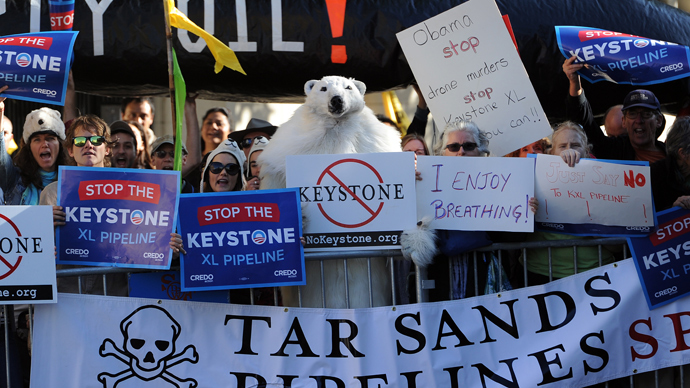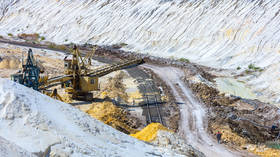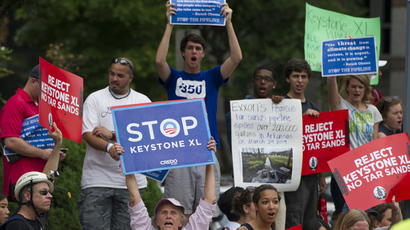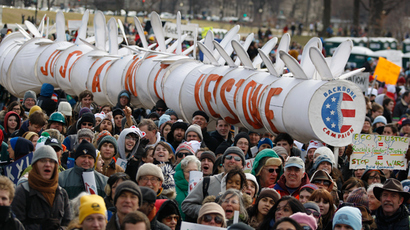Keystone pipeline won’t hurt environment much, US govt report says

The US State Department raised few objections to the environmental impact of the Keystone XL pipeline in a report released Friday, saying that the project won’t impact the pace of Canadian oil sands development and its contribution to climate change.
While the State Department took no position on the project and stopped short of recommending if the line should be built, it did claim the pipeline is more environmentally sound than other options.
"The approval or denial of any single project is unlikely to significantly affect the rate of extraction of the oil and the oil sands, or the refining of heavy crude on the US Gulf Coast," a State official told reporters ahead of the release.
The report marks a major step toward the completion of the US$7 billion oil pipeline that would allow transport high-carbon tar sands crude from western Canada to the Gulf of Mexico. President Barack Obama is expected to make a definitive decision on approval of Keystone XL in a matter of months. The State Department’s report will give Obama political cover to endorse the pipeline in the face of much opposition in the US based on environmental concerns.
The report posited that tar sands from Canada will be developed regardless of whether the pipeline is approved, and that other options to transport oil to the Gulf Coast - including rail, trucks and barges - would be worse in exacerbating climate change.
The State Department is expected to hold a press conference later Friday.
The 1,179-mile pipeline would move the tar sands oil through the heart of the United States, from western Canada to a hub in Nebraska, where it would connect with other existing pipelines to deliver 800,000 barrels of crude oil a day to refineries in Texas.
Opponents of Keystone XL say that, in addition to the carbon-intensive impact that results from the extraction of tar sands that will only worsen the effects of climate change, the pipeline will also put communities nearby at risk of oil spills and subsequent fallout.
Critics have also pointed out that most of the oil that will travel through Keystone XL will go to growing economies overseas, like China, that have an increasing demand for more fossil fuels. The pipeline, detractors say, is unlikely to lower the price of gasoline in the US.
Proponents have said the project will create tens of thousands of jobs for the communities near the pipeline in the US. The State Department predicts the pipeline would create an immediate 5,000 to 6,000 jobs. Others have said long-term job creation, though, is nowhere near either estimate. President Obama said as much last March.
"The most realistic estimates are this might create maybe 2,000 jobs during the construction of the pipeline, which might take a year or two, and then after that we're talking about somewhere between 50 and 100 jobs in an economy of 150 million working people,” he said.
The State Department needs to approve the project given it crosses the US border. Secretary of State John Kerry has not given any indication about where he stands on Keystone XL, nor did he during his term in the Senate before being tapped for State. The Environmental Protection Agency and other departments will have 90 days to comment before State makes a final recommendation to Obama.
Despite comments on how few jobs the pipeline would create, Obama said this week in his State of the Union address that the US must have an “all-of-the-above” energy strategy that embraces a variety of sources.
The comments rankled environmentalists who pointed out that Obama has said attacking global warming was a top priority for his administration.
"We believe that continued reliance on an 'all-of-the-above' energy strategy would be fundamentally at odds with your goal of cutting carbon pollution," the environmentalists wrote in a letter to Obama.
There were several major accidents in 2013 involving crude oil rail shipments, including a major explosion in North Dakota late in the year and an accident that killed 47 people in Lac-Mégantic, Canada.
Obama blocked Keystone XL approval in January 2012, saying he needed more time for a fair review, pushing the decision to after his reelection campaign.
The hesitation has not gone over well in Canada, which relies heavily on energy exports. The northern Alberta region has the world’s third largest oil reserves, at 170 billion barrels, according to AP.
In the meantime, the 485-mile southern arm of the pipeline, operated by TransCanada, began moving oil last week. Given it does not cross the US border, it did not require presidential approval. The southern section runs from Cushing, Oklahoma through Texas on the way to the Gulf Coast. The northern section awaiting approval runs through Montana, South Dakota, Nebraska and Kansas before heading into Oklahoma.















